Related Research Articles
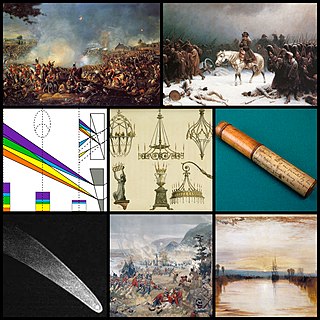
The 1810s was a decade of the Gregorian calendar that began on January 1, 1810, and ended on December 31, 1819.
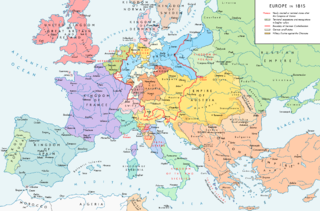
The Congress of Vienna of 1814–1815 was a series of international diplomatic meetings to discuss and agree upon a possible new layout of the European political and constitutional order after the downfall of the French Emperor Napoleon Bonaparte. Participants were representatives of all European powers and other stakeholders, chaired by Austrian statesman Klemens von Metternich, and held in Vienna from September 1814 to June 1815.

Klemens Wenzel Nepomuk Lothar, Prince of Metternich-Winneburg zu Beilstein, known as Klemens von Metternich or Prince Metternich, was a conservative Austrian statesman and diplomat who was at the center of the European balance of power known as the Concert of Europe for three decades as the Austrian Empire's foreign minister from 1809 and Chancellor from 1821 until the liberal Revolutions of 1848 forced his resignation.
The Treaty of Paris, signed on 30 May 1814, ended the war between France and the Sixth Coalition, part of the Napoleonic Wars, following an armistice signed on 23 April between Charles, Count of Artois, and the allies. The treaty set the borders for France under the House of Bourbon and restored territories to other nations. It is sometimes called the First Peace of Paris, as another one followed in 1815.
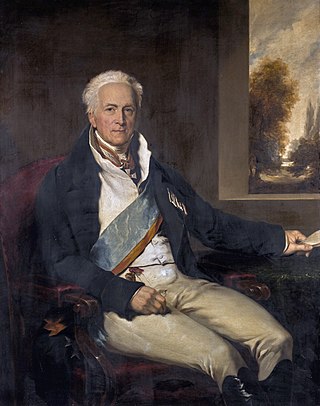
Karl August Fürst von Hardenberg was a Prussian statesman and Chief Minister of Prussia. While during his late career he acquiesced to reactionary policies, earlier in his career he implemented a variety of Liberal reforms. To him and Baron vom Stein, Prussia was indebted for improvements in its army system, the abolition of serfdom and feudal burdens, the throwing open of the civil service to all classes, and the complete reform of the educational system.

The Concert of Europe was a general consensus among the great powers of 19th-century Europe to maintain the European balance of power, political boundaries, and spheres of influence. Never a perfect unity and subject to disputes and jockeying for position and influence, the Concert was an extended period of relative peace and stability in Europe following the Wars of the French Revolution and Napoleonic Wars which had consumed the continent since the 1790s. There is considerable scholarly dispute over the exact nature and duration of the Concert. Some scholars argue that it fell apart nearly as soon as it began in the 1820s when the great powers disagreed over the handling of liberal revolts in Italy, while others argue that it lasted until the outbreak of World War I and others for points in between. For those arguing for a longer duration, there is generally agreement that the period after the Revolutions of 1848 and the Crimean War (1853–1856) represented a different phase with different dynamics than the earlier period.

The Austrian Empire, officially known as the Empire of Austria, was a multinational European great power from 1804 to 1867, created by proclamation out of the realms of the Habsburgs. During its existence, it was the third most populous monarchy in Europe after the Russian Empire and the United Kingdom. Along with Prussia, it was one of the two major powers of the German Confederation. Geographically, it was the third-largest empire in Europe after the Russian Empire and the First French Empire.
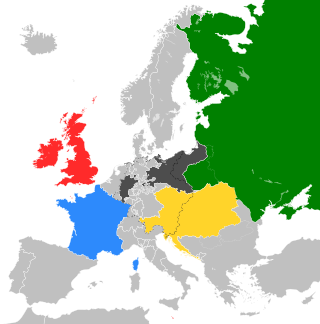
The Quintuple Alliance came into being at the Congress of Aix-la-Chapelle in 1818, when France joined the Quadruple Alliance created by Austria, Prussia, the Russian Empire, and the United Kingdom of Great Britain and Ireland. The European peace settlement concluded at the Congress of Vienna in 1815.

The Holy Alliance was a coalition linking the monarchist great powers of Austria, Prussia and Russia, which was created after the final defeat of Napoleon at the behest of Emperor (Tsar) Alexander I of Russia and signed in Paris on 26 September 1815. The alliance aimed to restrain liberalism and secularism in Europe in the wake of the devastating French Revolutionary Wars and the Napoleonic Wars; it nominally succeeded in this until the Crimean War. Chancellor Otto von Bismarck managed to reunite the Holy Alliance following the unification of Germany in 1871, but the alliance again faltered by the 1880s over Austrian and Russian conflicts of interest over the dissolution of the Ottoman Empire.
The Conservative Order was the period in political history of Europe after the defeat of Napoleon in 1815. From 1815 to 1830, a conscious program by conservative statesmen, including Metternich and Castlereagh, was put into place to contain revolution and revolutionary forces by restoring the old orders, particularly the previously-ruling aristocracies. On the other hand, in South America, in light of the Monroe Doctrine, the Spanish and the Portuguese colonies gained independence.
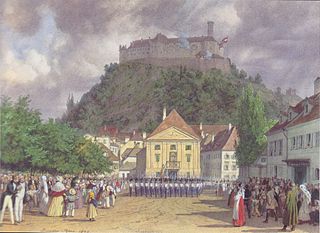
The Congress of Laibach was a conference of the allied sovereigns or their representatives, held in 1821 as part of the Congress System which was the decided attempt of the five Great Powers to settle international problems after the Napoleonic Wars through discussion and collective weight rather than on the battlefield. A result of the Congress was the authorization of Austrian intervention in the Kingdom of the Two Sicilies in order to quell a liberal uprising.
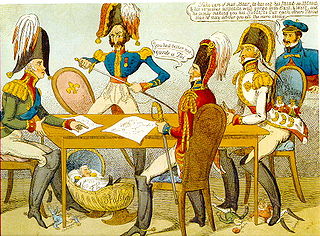

The Congress of Aix-la-Chapelle, held in the autumn of 1818, was a high-level diplomatic meeting of France and the four allied powers Britain, Austria, Prussia and Russia, which had defeated it in 1814. The purpose was to decide the withdrawal of the army of occupation from France and renegotiate the reparations it owed. It produced an amicable settlement, whereby France refinanced its reparations debt; the Allies in a few weeks withdrew all of their troops.
The Treaty of Chaumont was a series of separately-signed but identically-worded agreements in 1814 between the Austrian Empire, the Kingdom of Prussia, the Russian Empire and the United Kingdom. They were dated 1 March 1814, although the actual signings took place on 9 or 19 March. The treaty was intended to draw the powers of the Sixth Coalition into a closer alliance in case France rejected the peace terms they had recently offered. Each power agreed to put 150,000 soldiers in the field against France and to guarantee for twenty years the European peace against French aggression.
The Eight Articles of London, also known as the London Protocol of 21 June 1814, were a secret convention between the Great Powers: the United Kingdom, the Kingdom of Prussia, the Austrian Empire, and the Russian Empire to award the territory of current Belgium and The Netherlands to William I of the Netherlands, then "Sovereign Prince" of the United Netherlands. He accepted this award on 21 July 1814.
The Allied sovereigns' visit to England occurred in June 1814 to celebrate the peace following the defeat of France and abdication of Napoleon Bonaparte in April 1814. The sovereigns and generals of the Coalition Allies – comprising Austria, Prussia, Russia, Sweden, the United Kingdom, and a number of German States – took part in a state visit and various peace celebrations in London before progressing to the Congress of Vienna later that year.

Alexander I, nicknamed "the Blessed", was Emperor of Russia from 1801, the first king of Congress Poland from 1815, and the grand duke of Finland from 1809 to his death in 1825. He was the eldest son of Emperor Paul I and Sophie Dorothea of Württemberg.
The Protocol of St. Petersburg was an 1826 Anglo-Russian agreement for the settlement of the Greek War of Independence.
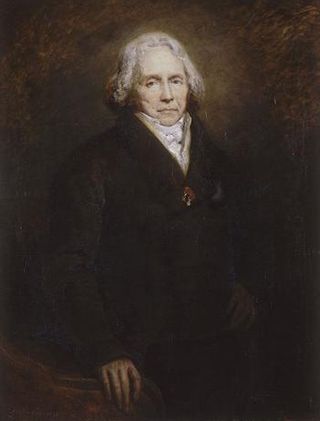
The Secret Treaty of Vienna was a defensive alliance signed on 3 January 1815 by France, the Austrian Empire and Great Britain. It took place during the Congress of Vienna, negotiations on the future of Europe following Napoleon's defeat in the War of the Sixth Coalition.

The Congress of Châtillon was a peace conference held at Châtillon-sur-Seine, north-eastern France, from 5 February to 5 March 1814, in the latter stages of the War of the Sixth Coalition. Peace had previously been offered by the Coalition allies to Napoleon I's France in the November 1813 Frankfurt proposals. These proposals required that France revert to her "natural borders" of the Rhine, Pyrenees and the Alps. Napoleon was reluctant to lose his territories in Germany and Italy and refused the proposals. By December the French had been pushed back in Germany and Napoleon indicated that he would accept peace on the Frankfurt terms. The Coalition however now sought to reduce France to her 1791 borders, which would not include Belgium.
References
- This article incorporates text from a publication now in the public domain : Chisholm, Hugh, ed. (1911). "Troppau, Congress of". Encyclopædia Britannica . Vol. 27 (11th ed.). Cambridge University Press. p. 307.
- Ghervas, Stella (2008). Réinventer la tradition. Alexandre Stourdza et l'Europe de la Sainte-Alliance. Paris: Honoré Champion. ISBN 978-2-7453-1669-1.
- Jarrett, Mark (2013). The Congress of Vienna and its Legacy: War and Great Power Diplomacy after Napoleon. London: I. B. Tauris & Company, Limited. ISBN 978-1780761169.
- Schneider, Karin; Kurz, Stephan, eds. (2018). Mächtekongresse 1818-1822. Digitale Edition. Vienna: Austrian Academy of Sciences. ISBN 978-3-9504783-0-3.